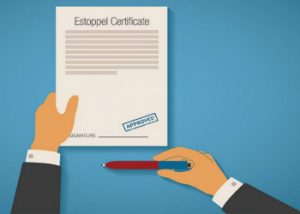For most tenants, the request for an estoppel comes as a surprise as it is a legal document and the landlord is likely asking for a turnaround of 10 days. So what is an estoppel certificate?
During your lease term, your landlord could send a request asking you to execute an estoppel certificate. For most tenants, the request for an estoppel comes as a surprise as it is a legal document and the landlord is likely asking for a turnaround of 10 days. So what is an estoppel certificate? Are you really required to fill this out and send it back?And should you take this opportunity to negotiate a better lease?
These are all great questions that are asked by business owners every day. Handled correctly, an estoppel certificate can protect your interest in the lease. On the other hand, a poorly drafted and executed estoppel can come back and hurt you down the road.
An estoppel certificate is a confirmation from the tenant that the facts presented are accurate and complete at that moment in time. This request is typically triggered by the refinance or sale of the property, and it might include the following information

- A list of the documents that make up the tenant’s lease agreement.
- A confirmation of rent and expenses currently being paid and verification that there are no past due or prepaid amounts.
- A statement that the landlord has met all of its obligations, and is not in default of the lease.
The estoppel certificate’s purpose is to provide the lender or buyer with some assurance that key documents and facts are accurate, and represent the entirety of your agreement with the landlord. The bottom line is that the lender or potential buyer does not want to get surprised by a claim or obligation that may have existed at the time the estoppel was signed.

Do I Need to Sign It?
Most leases do require a tenant to provide the estoppel certificate upon request. Since the document is critical to most finance and purchase transactions, the lease will include a very short window and the risk of default if a tenant does not comply. With that said, you are not required to sign an estoppel certificate that you do not believe is accurate. If you believe the facts presented are inaccurate or incomplete, you owe it to yourself to make corrections to the document and submit to the landlord so accurate information is brought to the table.
Should I Take This Opportunity to Renegotiate My Lease?
I have had several clients ask if they can leverage the landlord’s request for an estoppel certificate to get some concessions in exchange. Unless the tenant has a legit imate gripe with the landlord, the answer is no. An estoppel is not a license to renegotiate the lease or ask for concessions. However, it is the perfect time to bring up any side agreements, disputes, or concerns you have with the landlord. I have helped many clients resolve disputes during this process, as the landlord does not want to present the potential buyer or lender with a cloudy situation.
Do I Pose any Risk by Signing an Estoppel?
While an estoppel is not intended to modify the lease agreement, an inaccurate or poorly written estoppel can have serious repercussions for a tenant down the road. This can occur if facts presented in the certificate are wrong or not consistent with the lease (i.e. wrong expiration date, wrong security deposit or rent amount, etc.). Another trap is confirming the landlord is in compliance with the lease, when an issue may exist of which you are unaware. For example, the landlord may be inadvertently charging you for an expense that is not permitted under the lease. If this is identified later on, the current landlord might try and use the estoppel certificate as a defense for not having to correct the issue. While the estoppel certificate doesn’t always protect the landlord in such a situation, it certainly doesn’t help your efforts to right a wrong.
For questions about an Estoppel Certificate or help with an Eviction in California, Contact Us Today.
